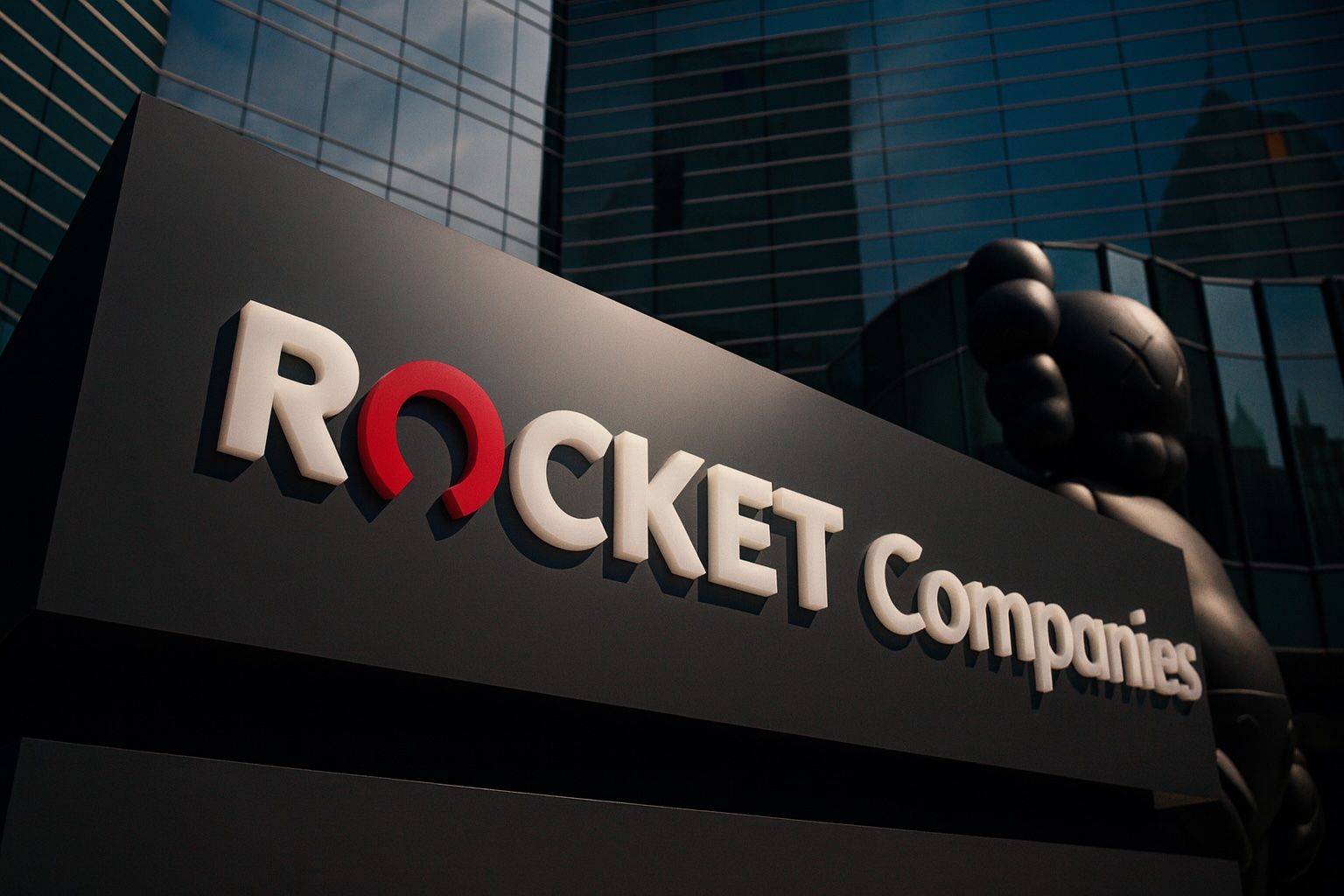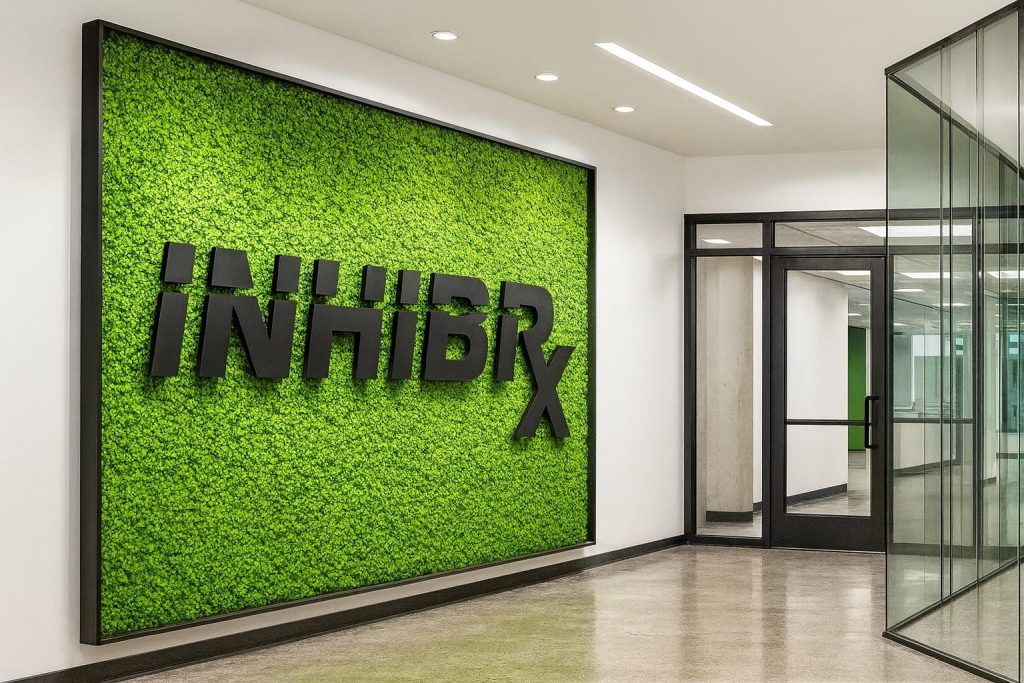- Rocket Companies (NYSE: RKT) stock is hovering around the mid-$17 range as of Oct. 24, 2025google.com, surging roughly 80% year-to-date in 2025youtube.com despite recent volatility.
- Mortgage mega-deals: Rocket just closed a $14.2 billion acquisition of Mr. Cooper Group on Oct. 1ir.rocketcompanies.com – the largest mortgage merger ever – and earlier acquired Redfin for $1.75 billion in Julypaulweiss.com, transforming itself into a broad homeownership platform.
- Stock momentum: RKT shares have rallied ~50% since the Mr. Cooper deal was unveiled in Marchcrainsdetroit.com, though they pulled back from ~$20 highs in early October. The stock trades well above its 52-week low (~$10) but below its year-high of $22.56google.com amid ongoing market swings. A massive 57% short interest in RKTseekingalpha.com underscores the volatility, with some eyeing a possible short squeeze.
- Housing context: Mortgage rates, while still elevated, have eased to ~6.2% (30-year fixed) – the lowest level in over a yearrealtor.com – potentially reviving homebuying and refinancing. Rocket’s upcoming Q3 earnings (due Oct. 30) are expected to show EPS around $0.04 (down ~50% YoY)sg.finance.yahoo.com, reflecting the challenging environment even as revenue stabilizes.
- Analyst outlook: Mixed views – Bank of America upgraded RKT to “Buy” in September with a $24 targetmarketbeat.com, and RBC Capital recently boosted its target to $20investing.com on growth prospects. However, consensus remains neutral (“Hold”)marketbeat.com, with price targets ranging from ~$14 to $24marketbeat.com as Wall Street debates Rocket’s post-merger potential.
Stock Price Rallies Amid Mortgage Market Shifts
Rocket Companies’ stock has been on a wild ride this year. As of Oct. 24, RKT was trading around $16.94-$17 per sharegoogle.com – roughly flat on the day after some early swings (intraday high ~$17.10, low ~$16.41)google.com. That price is about 70-80% higher than where it started 2025, making Rocket a standout gainer in an otherwise sluggish housing sectoryoutube.com. The stock reached as high as the low-$20s in early October, when excitement over Rocket’s latest acquisition peaked, before cooling off. In fact, RKT shares have climbed about 54% since late March (when its big merger was announced), briefly trading near $20 at the deal’s closingcrainsdetroit.com.
This momentum marks a sharp turnaround from last year’s doldrums – Rocket hit a 52-week low around $10.06 during the 2024 market downturngoogle.com. Since then, a combination of improving sentiment and strategic news has lifted the stock into the high-teens. Even after recent profit-taking, RKT remains well below its 2021 highs (back when ultra-low rates fueled a refinancing boom), but the trend has been upward in 2025. Its 50-day moving average sits around $18.6, above the 200-day of $15.4marketbeat.com, reflecting the strong rally over the summer. Analysts note that Rocket’s beta ~2.2 means the stock is quite volatilemarketbeat.com – and indeed, daily swings have been common as investors react to interest rate news and company updates.
Market context has played a big role. Investor optimism grew in anticipation of lower mortgage rates ahead and Rocket’s own transformation efforts. However, broader market jitters (such as a recent pullback in tech stocks and bonds) have occasionally weighed on RKT. On Oct. 24, for example, the stock edged down from the prior day’s $17.61 close to about $16.94 by the bellgoogle.com, mirroring a general market fade. Overall, though, Rocket’s stock is up roughly 80% in 2025youtube.com – a remarkable run fueled by hopes that the company can capitalize on a rebounding housing market and its new, expanded business model.
$14 Billion Merger Spawns a Mortgage Giant
Rocket Companies’ ambitious evolution hit a crescendo this month with a blockbuster acquisition. On October 1, Rocket completed its $14.2 billion all-stock takeover of Mr. Cooper Group, a major mortgage servicerir.rocketcompanies.com. This deal – touted as “the largest independent mortgage deal in history”ir.rocketcompanies.com – unites America’s biggest mortgage originator (Rocket) with the nation’s largest loan servicer (Mr. Cooper). By joining forces, the combined company now oversees nearly 10 million home loan customers across origination and servicingir.rocketcompanies.com. “Homeownership is the bedrock of the American Dream. By combining mortgage servicing and loan origination, along with home search through Redfin, we are paving the path for Americans to own the dream,” Rocket CEO Varun Krishna said upon announcing the merger. The move essentially makes Rocket a one-stop mortgage powerhouse, from finding a home to financing and managing the loan.
Crucially, Rocket used its rising stock as currency for the Mr. Cooper deal – originally valued at $9.4 billion in March, the transaction swelled to $14.2 billion by closing thanks to RKT’s price gains. Mr. Cooper’s shareholders received Rocket’s Class A shares, and Mr. Cooper CEO Jay Bray has joined Rocket’s leadership (now serving as CEO of Rocket Mortgage)ir.rocketcompanies.com. The integration brings significant scale: Rocket’s servicing portfolio will roughly double, providing steady fee income and a huge customer base to refinance or cross-sell. “By integrating Mr. Cooper’s servicing strength with Rocket’s origination capabilities and AI technology…our goal is to lower costs and make the process easier,” Krishna notedir.rocketcompanies.com. All Mr. Cooper operations will be rebranded under the Rocket umbrellair.rocketcompanies.com, cementing the Detroit-based Rocket’s position as a mortgage behemoth.
This wasn’t Rocket’s only big move in 2025. Over the summer, the company also acquired Redfin, a well-known online real estate brokerage. The $1.75 billion all-stock Redfin deal closed in Julypaulweiss.com, bringing the popular home-listings portal and its nationwide network of real estate agents into Rocket’s fold. By adding Redfin, Rocket now has a direct hand in the home search and purchase process, beyond just loans. In practice, the tie-up allows seamless referrals: homebuyers browsing on Redfin can be funneled to Rocket Mortgage, and vice versa. The companies immediately rolled out a program called “Rocket Preferred Pricing,” offering Redfin buyers a 1%-point interest rate reduction in the first year of their mortgage if they finance through Rocketpaulweiss.com. More joint products are planned to connect agents, buyers, and Rocket’s lending services in the coming monthspaulweiss.com.
With Redfin’s tech platform and brand plus Mr. Cooper’s servicing heft, Rocket has effectively transformed from a pure lender into a comprehensive homeownership platform. The company now spans mortgage origination, real estate search, title and closing services, and long-term loan servicing – an end-to-end model that few competitors can match at this scale. Rocket’s leadership argues these acquisitions position it for the future: “Together with Mr. Cooper, Rocket’s capabilities span the entirety of homeownership – home search, financing, title, closing and servicing,” the company said, noting it has invested heavily in data and AI to tie it all togetherir.rocketcompanies.com. Importantly, Rocket insists these deals won’t sideline its partners; the company has dismissed rumors that buying Redfin and Mr. Cooper means retreating from brokers, affirming that it remains committed to supporting independent mortgage brokers even as its empire growsts2.tech.
Housing Headwinds vs. Fintech Initiatives
Rocket’s bold expansion comes amid a still-challenging backdrop for the housing and mortgage industry. After interest rates skyrocketed last year, the U.S. 30-year mortgage rate spent much of early 2025 above 7%. That surge slammed refinance activity and cooled home sales, directly impacting Rocket’s volume. However, there are signs of relief: as of late October, average mortgage rates have fallen to around 6.19% – their lowest level in over a yearrealtor.com. For the week ending Oct. 23, rates dipped from 6.27% to 6.19%, according to Freddie Mac datarealtor.com. This nearly 1-point drop from 2025’s peaks is sparking hope that more buyers will return and that a backlog of homeowners could finally refinance if rates ease further. “Mortgage pressures ease” when rates fall, as one market commentary noted, which could “rally [housing stocks] on lower rates”*marketbeat.com – a positive sign for Rocket.
Even so, current rates in the mid-6% range are a far cry from the sub-3% mortgages of 2021, meaning the market remains in a slower gear. Home affordability is still stretched, and many potential sellers are “locked in” to ultra-low rates, limiting housing inventory. Rocket’s recent financials reflect this new normal. In Q2 2025, the company managed to grow revenue about 4.5% year-over-year to $1.36 billionmarketbeat.com – a modest uptick aided by cost cuts and incremental market share gains. It eked out a small profit of $0.04 per share that quartermarketbeat.com, beating Wall Street’s low bar (consensus was $0.03). But compared to a year prior (when EPS was $0.06marketbeat.com), earnings are down, and margins remain very thin. Net income was essentially breakeven last quartermarketbeat.com.
Upcoming Q3 results (set to be announced on Oct. 30) are expected to tell a similar story. Analysts project Rocket will report roughly $0.04 in earnings per share for Q3sg.finance.yahoo.com, which would mark a 50% decline from the $0.08 it earned in the same quarter last yearsg.finance.yahoo.com. The company has already guided that closed loan volumes and revenue for Q3 will be in line with the prior quarter, not yet showing a big rebound. Rocket’s CEO and board have emphasized “long-term transformation” over short-term profits during this period of industry lulls.
To navigate the headwinds, Rocket is leaning heavily into technology and efficiency, aiming to both trim costs and capture more business. Notably, the company is doubling down on its partnership with mortgage brokers as a source of growth. After years of tension with brokers (some of whom viewed Rocket as a competitor), Rocket in late September rolled out a broker-friendly manifesto at its Rocket Pro Experience (RPX) 2025 conference. The company unveiled 10 “Partner Promises” designed to win back brokers’ trust – including a pledge to never poach their clients or cross-sell Rocket’s other products to those borrowers without permissionts2.techts2.tech. Executives acknowledged brokers’ long-standing fears that big retail lenders woo customers only to later steal them; Rocket is publicly assuring that “we will never contact your client without your permission” in its wholesale channelts2.tech. Additionally, Rocket committed to transparent pricing, faster turn times, and a simple compensation structure for broker loansts2.techmarketbeat.com – moves aimed at improving its reputation in the broker community.
At the same event, Rocket debuted new AI-powered tools for brokers under its Rocket Pro division. One flagship offering is Rocket Pro Navigate, an artificial intelligence platform trained on vast mortgage data, which acts as a “virtual assistant” for loan officers. It can scan brokers’ client lists and documents to identify refinancing opportunities, analyze loan paperwork in seconds, and even generate draft emails or call scriptsts2.tech. For example, Navigate’s “Lead Scanner” combs through client databases and public records to find homeowners who might benefit from a cash-out refi or rate term change, then auto-generates personalized outreach templatests2.techts2.tech. Another feature listens to loan consultations and produces a summary and follow-up notes, saving brokers time on administrative workts2.tech. Alongside this, Rocket Pro Assist was launched to give brokers on-demand answers via chat and to streamline loan status updatests2.tech. The idea is that these AI tools will “eliminate busy work and research” for small brokerage shops, letting humans focus on advising clientsts2.tech.
These initiatives highlight Rocket’s aspiration to be as much a fintech innovator as a mortgage company. By investing in AI and integrating its services, Rocket aims to improve efficiency (critical when loan volumes are subdued) and to lock in future business (for instance, converting a Redfin user into a Rocket Mortgage client, then servicing that loan for years). The heavy focus on tech doesn’t mean Rocket is forgetting the human element, however. Industry experts caution that AI is only a tool – “no algorithm can guide someone through the stress…of a move,” as one real estate broker put itts2.tech. Rocket’s approach appears to be a hybrid one: use technology to streamline processes and cut costs, but maintain high-touch service via its army of mortgage bankers and now real estate agents. If successful, Rocket could emerge from the current housing slowdown with greater market share and a diversified revenue stream (more servicing fees, real estate commissions, etc.), positioning it strongly for when the cycle turns up.
Wall Street: Analysts Split on Post-Merger Prospects
With Rocket’s dramatic moves and stock resurgence, analysts have been updating their models – and the commentary is mixed. According to MarketBeat, Wall Street’s consensus rating on RKT is a “Hold” overallmarketbeat.com. Out of 15+ analysts, only a few recommend buying at current levels, while the majority advise holding and a minority still suggest sellingmarketbeat.com. Price targets vary widely, from lows around $14 (implying potential downside) to highs at $24marketbeat.com (implying significant upside), reflecting very different views on Rocket’s trajectory. The average target of about $17 is roughly where the stock trades nowmarketbeat.com, indicating the market is in “wait-and-see” mode pending more evidence.
That said, bullish voices have grown louder in recent weeks. Notably, Bank of America upgraded Rocket to a “Buy” in mid-September and raised its price objective from $21 to $24marketbeat.com. BofA’s analysts were encouraged by Rocket’s strategic shift to a platform model and the expectation that lower interest rates in 2024-2026 could re-energize its earnings. Similarly, RBC Capital Markets has highlighted Rocket’s expanding capacity and market share. RBC boosted its RKT target to $20 (from $16) while maintaining a neutral Sector Perform viewinvesting.com. The firm noted Rocket’s recent investor day outlined ambitious goals – like aiming for 8% of the purchase mortgage market and 20% of the refinance market by 2027 – which, if achieved, would significantly boost origination volumesinvesting.com. Other positive signals: Deutsche Bank reiterated a Buy rating in Octobermarketbeat.com, and Jefferies earlier this year raised its target to $14 (after the stock’s climb) and now sits at Holdmarketbeat.com, implying the upside from here will depend on execution.
On the cautious side, UBS recently reaffirmed a Neutral stance with a price target near $17marketbeat.com, essentially saying the stock is fairly valued for now. Some analysts worry that Rocket’s rally already prices in a lot of good news, leaving less margin for error. The consensus EPS estimates for full-year 2025 are still modest – around $0.15marketbeat.com – reflecting thin profitability until the mortgage market fully rebounds. Valuation is a consideration too: even after the acquisitions, Rocket has a market cap near $37-46 billionmarketbeat.comgoogle.com (depending on share count and fluctuations), which gives it a rich earnings multiple based on current profits. Zacks Investment Research just upgraded RKT from “strong sell” to “hold” in mid-Octobermarketbeat.com, acknowledging improving trends but not yet convinced of a buy.
One striking statistic attracting attention is Rocket’s very high short interest – about 57% of its float is sold shortseekingalpha.com. This means many investors (likely hedge funds) are betting on the stock falling. Such a huge short position can itself create volatility. If Rocket delivers better-than-expected results or if sentiment shifts, shorts could rush to cover, potentially causing a sharp short-squeeze rally. In fact, a recent Seeking Alpha analysis flagged Rocket as an “ideal candidate” for a short squeeze, given the heavy shorting and projections for accelerating earnings growth in FY2026–27 if the company’s strategy pays offseekingalpha.com. On the flip side, the short sellers may be expressing legitimate concerns – for instance, about integration risks with two major acquisitions at once, or the possibility that mortgage rates might stay higher for longer and choke off the hoped-for recovery. Their presence sets up an interesting dynamic: Rocket could swing significantly on any surprise developments, as bulls and bears vie over its future.
Future Outlook: Rocket’s Trajectory into 2026
As Rocket Companies digests its transformative year, the key question is whether all these moves will translate into sustained growth – will the Rocket truly take off, or sputter? Optimists point out that the company is now positioned to thrive when housing and credit cycles improve. By 2026, many forecasts expect the Federal Reserve to have eased policy, bringing mortgage rates down further. “The mortgage leader is giving investors several reasons to be optimistic,” wrote one Motley Fool analyst, who even predicted Rocket could be their “best investment in 2026”reportify.cn. The combination of Rocket’s enhanced scale (tens of millions of customers to market to) and diversified services (from home search to servicing) means it can generate revenue at multiple points of the homeownership journey, not just at loan origination. Cross-selling opportunities are substantial – for example, a Rocket Mortgage client can be offered a real estate agent via Redfin, a home equity loan later on, or insurance and personal loans through Rocket’s other fintech offerings. The expanded ecosystem also provides more data to feed Rocket’s AI and marketing, potentially creating a virtuous cycle of smarter customer acquisition.
Rocket’s own targets underscore the growth potential: at its investor day, management outlined scenarios of $150–250 billion in annual originations by 2027investing.com (vs. ~$100 billion today), which would imply major market share gains. They plan to get there partly by leveraging the huge mortgage servicing rights (MSR) portfolio acquired – essentially, using servicing as a pipeline for future refinance and purchase loansinvesting.com. With Mr. Cooper’s book, Rocket now earns fee income on loans even if it didn’t originate them, and it gets a first crack at refinancing those customers when rates drop. This could become a low-cost customer acquisition engine (the customers are already in-house) fueling loan volumes when the timing is rightinvesting.com. Additionally, Rocket’s emphasis on brokers and partners could help capture more purchase loans, an area where it historically lagged the broker-focused UWM. If Rocket can convince brokers that “we’re on your side” with initiatives like the no-poaching pledge and tech toolsts2.techts2.tech, it could claw back share in that important channel.
However, risks abound on Rocket’s journey. The integrations of Redfin and Mr. Cooper will be complex and costly – cultural clashes, tech system integrations, and realization of synergies are all challenges to navigate over the next year or two. There’s also the debt and dilution question: while both acquisitions were all-stock deals (limiting new debt), they did significantly expand Rocket’s share count and obligations. The company’s debt-to-equity ratio stands around 2.36marketbeat.com, and total liabilities jumped over 50% year-on-year (to $22.9B) after absorbing Mr. Cooper’s balance sheetgoogle.com. Executing a smooth merge without disrupting service or alienating customers will be critical – any stumbles could invite regulatory scrutiny or competitor poaching.
Moreover, macroeconomic uncertainty still looms. If inflation flares back up or the Fed keeps rates higher than expected, the anticipated mortgage rebound could be delayed. Even in a moderate rate environment (~6%), many homeowners have no incentive to refinance, and first-time buyers face affordability hurdles. Rocket will need to drive growth through market share gains and new products in the meantime – not an easy task in a fiercely competitive field. Giants like Wells Fargo have pulled back from mortgages, which opens some opportunity, but rivals like UWM (United Wholesale Mortgage) and newer fintech players are aggressively courting business as well. Rocket’s large marketing budget and tech edge are advantages, but the company must prove it can convert those into better margins and profits consistently, not just originate loans at razor-thin profit for the sake of volume.
For now, investors seem willing to give Rocket the benefit of the doubt, as evidenced by the strong stock performance in 2025. The coming Q3 earnings report on Oct. 30 will be an important checkpoint – investors will look for any updates on cost synergies from Mr. Cooper, early traction from the Redfin integration, and commentary on how the mortgage pipeline is shaping up for Q4. Any hints of improving gain-on-sale margins or a pickup in applications could bolster the bull case. On the other hand, cautious guidance or integration hiccups might reinforce the bears’ case that Rocket’s valuation (and hefty market cap around $46 billiongoogle.com) has gotten ahead of its fundamentals.
Bottom line: Rocket Companies has rapidly evolved into a dominant, tech-driven mortgage player with fingers in every pie of the housing transaction. This year’s mega-merger and acquisitions have investors dreaming of a future where Rocket’s profits rocket higher when interest rates fall and housing activity normalizes. The stock’s recent blast-off reflects those high hopes. Whether RKT keeps soaring will hinge on execution in the next few quarters and the path of the housing market. If management delivers on promises and the winds turn in Rocket’s favor, analysts say the stock’s rally could be just the “first stage” of a longer ascent. But if challenges emerge, Rocket may have to throttle back. As one market observer quipped: For Rocket Companies and its investors, the countdown to 2026 is on – and all eyes are watching to see if this Rocket can achieve escape velocity or comes back down to earth.
Sources: Rocket Cos. Investor Relationsir.rocketcompanies.com; PR Newswireir.rocketcompanies.comir.rocketcompanies.com; Paul Weiss M&A Newspaulweiss.compaulweiss.com; Yahoo Financesg.finance.yahoo.com; Freddie Mac / Realtor.comrealtor.com; MarketBeat/SeekingAlphamarketbeat.comseekingalpha.com; TS2.tech (TechStock²)ts2.techts2.tech; Crain’s Detroit Businesscrainsdetroit.com; MarketBeat instant analysismarketbeat.commarketbeat.com.









